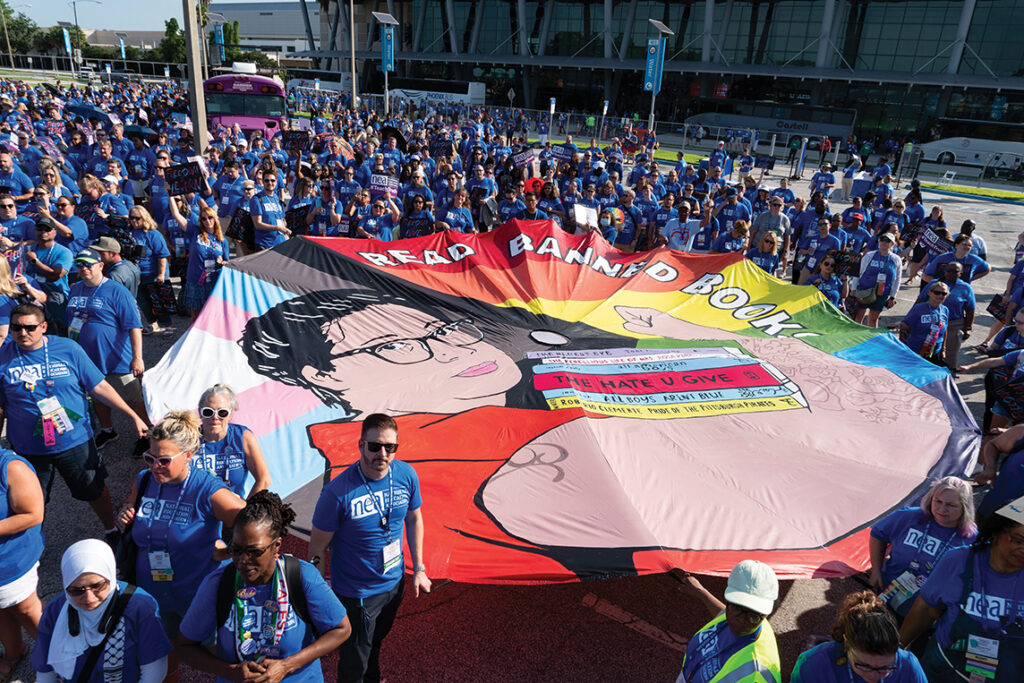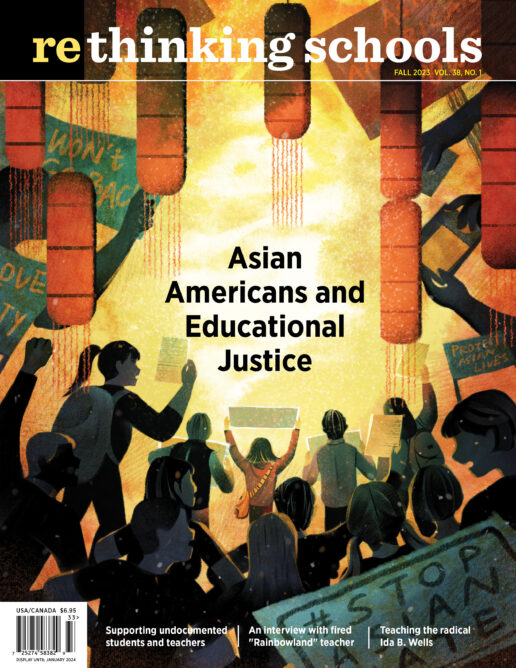Love, Solidarity, and Defiance: Healing Our Schools and Communities

“I have students from multiple different cities and ages all over the place. I want all of those students to know that even if they’re from a marginalized group, or they’re from a low-income household, or if they’re being discriminated against for some reason, or if they don’t feel like they’re being heard, that they do have a voice and that they can always speak up.”
These are the words of Melissa Bollow Tempel about an hour before she was fired by the School District of Waukesha, Wisconsin. Tempel, a 23-year veteran teacher, called a “master teacher” — “magical with children” — by her principal, was ousted after publicly criticizing the school district’s decision to prevent her 1st graders from singing “Rainbowland” during a school concert.
The song, by Dolly Parton and Miley Cyrus, calls for ending “all the hurt and the hate going on here” and “Living in a Rainbowland / Where you and I go hand in hand.” Previously, as part of their “controversial issues” policy, the district had ordered the removal of Black Lives Matter signs and pride flags from classrooms, and for Tempel, the decision to ban a song urging an end to hate was the final straw. She knew that such censorship thrives in silence and was “something that the public would be really concerned about,” so she tweeted “My 1st graders were so excited to sing Rainbowland for our spring concert but it has been vetoed by our administration. When will it end?”
After Tempel’s tweet went viral, the district removed her from the classroom and began an investigation that culminated in her termination. Eight of the nine school board members who voted to terminate Tempel were endorsed by the Republican Party — with five of the most recently elected endorsed by far right organizations such as Moms for Liberty.
But Tempel did not stop speaking out and from CNN to Rolling Stone much of her story has now been widely covered in the media. But less attention has been given to the outpouring of solidarity Tempel received. Supporters from across the district — and across the country — wrote her messages of support and outrage. An alliance of parents in Waukesha that had formed in response to some of the earlier troubling actions by the school district organized a campaign to flood the school board with emails and phone calls in support of Tempel. The United Unitarian Universalist Congregation organized a “Rainbowland” sing-along at the school board meeting. The Stonewall Chorale, New York City’s first LGBTQ+ choir, invited Tempel as the guest of honor to their Pride Month concert where they performed “Rainbowland.” This solidarity hardened Tempel’s resolve to keep fighting. (See interview with Tempel here)
Tempel’s firing is part of a broader backlash against teachers who teach for social justice and dare to speak out against racist, anti-LGBTQ+ policies and practices that scores of school districts and states are adopting across the country. But this story is also personal for Rethinking Schools.
Tempel is a former Rethinking Schools editor who has written articles in support of LGBTQ+ students and co-edited our book Rethinking Sexism, Gender, and Sexuality — a resource used by teachers and teacher educators across the United States and Canada. Before teaching in Waukesha, Tempel taught in Milwaukee Public Schools and also trained staff in anti-racist, anti-bias practices and curriculum. We know and celebrate Tempel’s work.
We’re not simply outraged at Tempel’s firing, we’re inspired by her love for her students and her community, the solidarity she’s received, and her defiance before and after her wrongful termination. Indeed, as teachers go back to school this year, the actions of Tempel and those who support her teach us exactly what is needed at this moment: love, solidarity, and loud, imaginative, defiance that articulates a vision of the world we are fighting for.
This summer, 700 Moms for Liberty activists convened in Philadelphia. With former president Donald Trump as the keynote speaker, these zealots hope to spread their campaigns for censorship and book banning in Wisconsin, Florida, and elsewhere to the rest of the country. Moms for Liberty, and their deep-pocketed right-wing backers, seek to deny students the freedom to learn. They want to purge libraries of books that suggest gender isn’t binary and prohibit classroom discussions of racial injustice. They want to force schools to out LGBTQ+ students before they are ready, deny transgender students access to restrooms and locker rooms that align with their gender, and ban transgender students from playing school sports. They target programs devoted to social-emotional learning and diversity, equity, and inclusion.
This is not a debate about appropriate public school policy. This is a right-wing campaign to promote Christian nationalism and white supremacy. It targets LGBTQ+ communities as part of a broader attack on the nation’s uneven and unfinished efforts to create a multiracial democracy. Ultimately, these right-wing culture warriors want to abolish the Department of Education and privatize public schools. Although they are a small minority, they have established an outsized influence over this country’s politics.
Even without the right-wing backlash, recent years have been devastating for schools and those who work in or depend on them. Although schools are back to in-person learning and mask-wearing is less commonplace, the scars of the pandemic still linger on teachers, school staff, and students. As we’ve written previously, the range of collective losses we’ve suffered goes far beyond the “learning loss” many school districts are now too narrowly focused on overcoming. It is not just “learning” that has been lost, but community, joy, and in some cases, hope.
For teachers returning to school after a summer of record heat and wildfire smoke once again forcing us to stay inside in much of the country, this moment will no doubt feel overwhelming. How can we heal the wounds of the pandemic years? How can we reverse the course of the political backlash? Instead of restricting students’ freedom to learn, how can we transform schools into greenhouses for democracy — working together to take action and solve the crises of racial inequality, LGBTQ+ discrimination, climate change, and others engulfing our lives? How do we push past despair and create schools that anchor communities of resilience, renaissance, and resistance?
We don’t have all the answers, as we’ll need to wade through these questions collectively. But we know that this moment calls for more teachers to follow Tempel’s example — speaking out and risking discipline and dismissal to oppose creeping fascism. Our students need educators like Melissa Bollow Tempel — sharing songs of hope (like “Rainbowland”!) and committed to anti-racist and LGBTQ+-affirming pedagogy and curricula.
This issue contains many examples of this crucial work. Lewis Steller writes about co-creating LGBTQ+-inclusive biology resources with his students to challenge the typical heteronormative ways most books discuss conception. Ken Hung shares a moving letter of solidarity he wrote to his Asian American students still reeling from the pandemic and the wave of anti-Asian bigotry that accompanied it. And Juan Córdova describes the “home” visits he made in an attempt to create a safe and welcoming classroom to repair some of the xenophobic harm his students and families seeking asylum in the United States had experienced.
Educating for social justice is what this moment demands, because it also prepares us for the future. In the face of a new wave of bigotry, hate, and violence, it is important to remember that this increasingly fascist mobilization is a white supremacist backlash to the recent rebellion for racial justice. The echoes of 2020, where millions of anti-racist protestors convened in cities and small towns across the country in what many have called the largest and broadest protests in U.S. history, still reverberate in our schools. Matt Reed illuminates this point when he describes how he and other teachers at Ida B. Wells-Barnett High School in Portland, Oregon, created a curriculum that refuses to sanitize Wells-Barnett’s legacy. Their efforts built off a decade-long struggle to change the school’s namesake from the notoriously racist president Woodrow Wilson that gained steam and success in the wake of 2020. Indeed, despite the backlash, students and educators continue to extend the wave of racial justice initiatives made possible by the millions who took to the streets three years ago.
We don’t know when the next eruption of protest will occur, or what issue might spark it, but we do know that it will happen. Yet the strength of tomorrow’s uprising will depend on the relationships we build in — and the lessons we learn from — the smaller struggles of today. As Rethinking Schools editor Ursula Wolfe-Rocca wrote, “It can be overwhelming to witness/experience/take in all the injustices of the moment; the good news is that they’re all connected. So if your little corner of work involves pulling at one of the threads, you’re helping unravel the whole damn cloth.” As we unravel the cloth of white supremacy, patriarchy, homophobia, and capitalism, let’s also begin to thread together our own vision for the future — taking a cue from songs like “Rainbowland”:
Wouldn’t it be nice to live in paradise,
Where we’re free to be exactly who we are . . .
Make wrong things right
And end the fight . . .
Every color, every hue.
Let’s shine on through
Together, we can start living in a Rainbowland.

